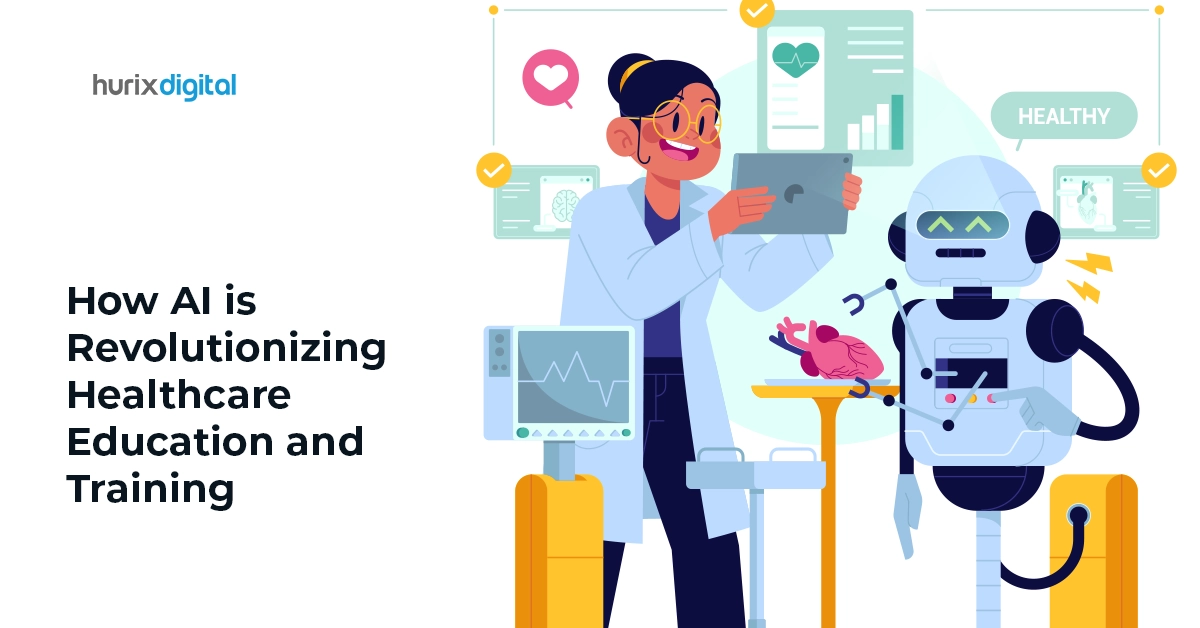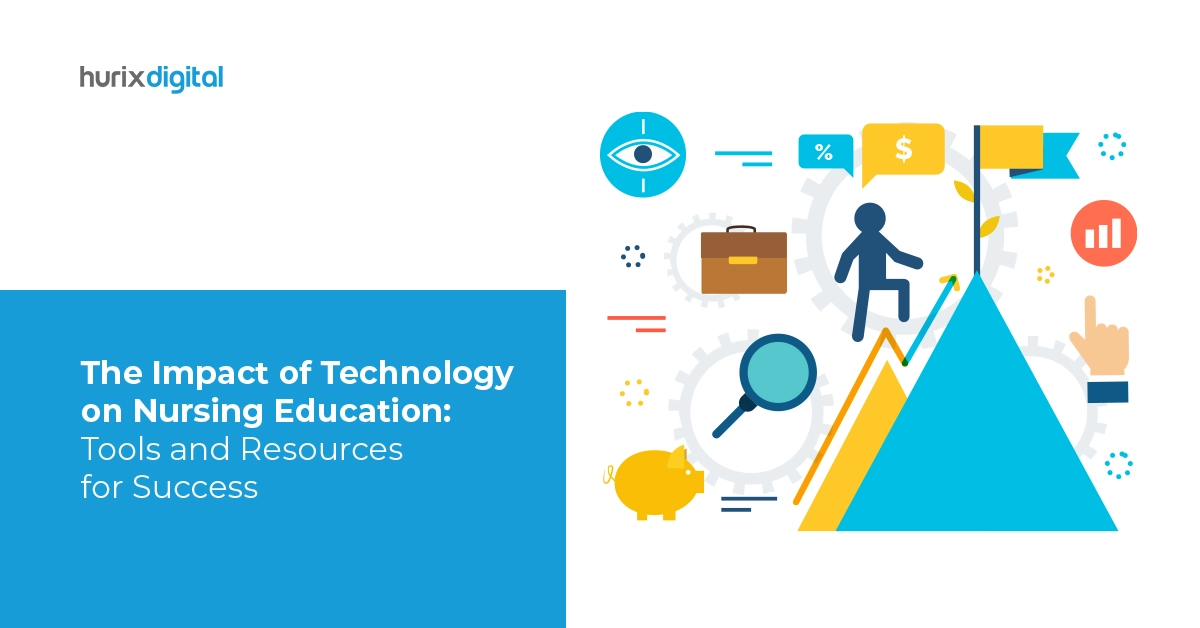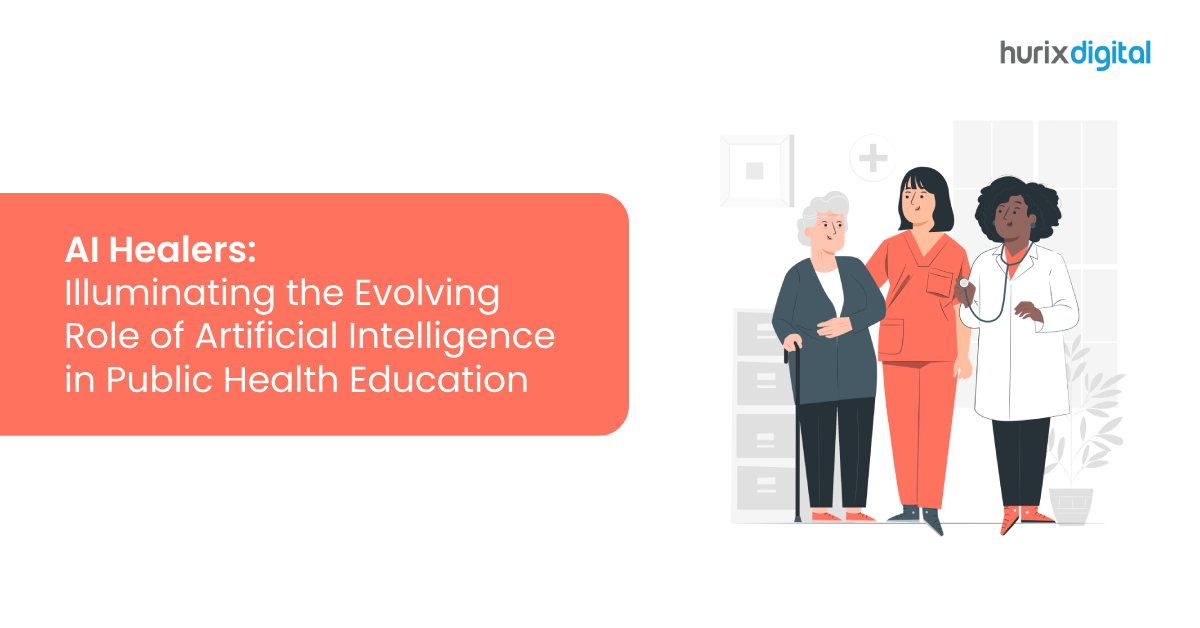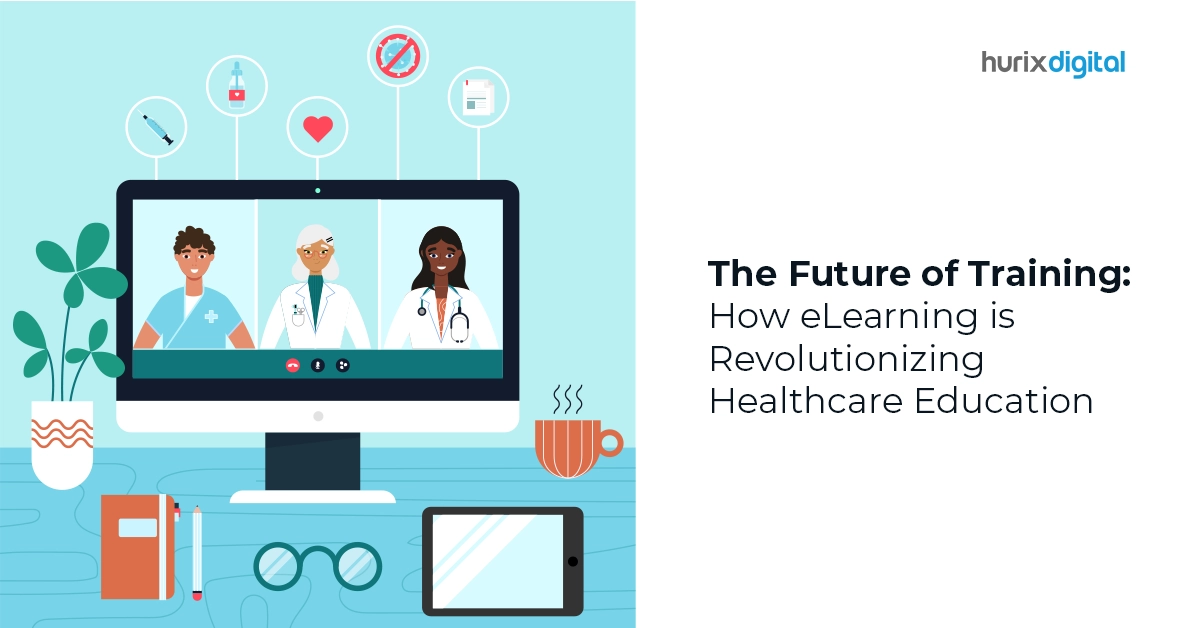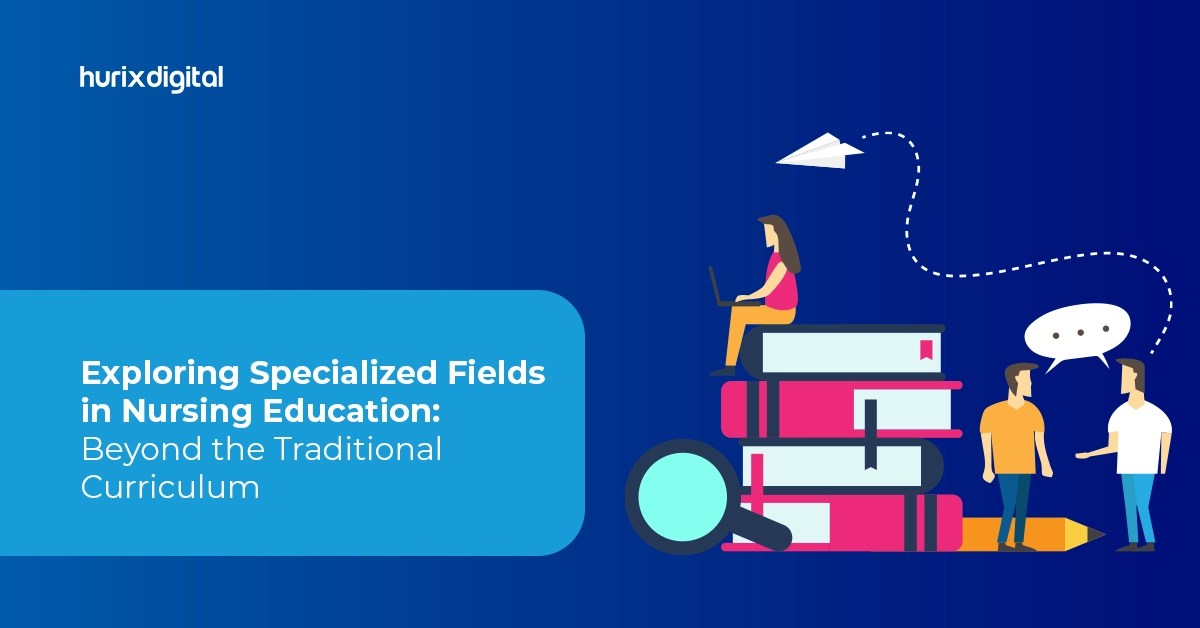Summary
Learn how AI is reshaping healthcare education and training, revolutionizing learning experiences for medical professionals. Discover the role of Hurix Digital in providing personalized solutions for effective training. Join the future of healthcare training with AI-powered solutions from Hurix Digital.
Artificial intelligence (AI) is playing a pivotal role in revolutionizing healthcare education. With the advancements in technology, AI is being integrated into various aspects of medical education to enhance learning and improve the skills of medical professionals.
AI algorithms are being used to analyze vast amounts of medical data, including textbooks, research papers, and patient records. By analyzing this data, AI systems can identify patterns and trends that can help educators and students stay up-to-date with the latest medical knowledge and advancements.
Furthermore, AI-powered virtual assistants are being used to provide personalized guidance and support to medical students. These virtual assistants can answer questions, provide explanations, and offer interactive learning experiences, making the learning process more engaging and effective.
In addition, AI is being utilized to develop intelligent tutoring systems that can adapt to the individual needs of learners. These systems can identify the strengths and weaknesses of each learner and provide personalized training programs to help them improve their skills.
Overall, AI is transforming healthcare education by providing access to vast amounts of medical information, personalized learning experiences, and adaptive training programs, ultimately enhancing the knowledge and skills of medical professionals.
Table of Contents:
- How is AI Transforming Healthcare Education?
1. Enhanced Learning and Skill Development
2. Personalized Training and Adaptive Learning
3. Simulation and Virtual Reality in Medical Education
4. Improving Patient Care and Outcomes - Conclusion
How is AI Transforming Healthcare Education?
1. Enhanced Learning and Skill Development
AI is revolutionizing healthcare education by enabling enhanced learning and skill development. Traditional methods of medical education often rely on passive learning, such as reading textbooks and attending lectures. However, AI technologies, such as virtual reality (VR) and augmented reality (AR), are changing the way medical professionals learn.
Simulation and virtual reality technologies are being used to create realistic medical scenarios that allow students to practice their skills in a safe and controlled environment. These simulations can range from simple procedures like taking a patient’s blood pressure to complex surgeries. By immersing themselves in these simulated environments, medical students can gain hands-on experience and develop their skills without the risk of harming real patients.
Furthermore, AI-powered tools can provide instant feedback and guidance during these simulations, helping students identify areas for improvement and refine their techniques. This real-time feedback can accelerate the learning process and enhance skill development.
Moreover, AI algorithms can analyze the performance of medical students during simulations and identify patterns that can be used to personalize their training. By understanding each student’s strengths and weaknesses, AI systems can provide targeted training programs that focus on areas that need improvement, leading to more effective learning and skill development.
In summary, AI technologies such as VR and AR are revolutionizing healthcare education by providing realistic simulations, instant feedback, and personalized training programs, enabling enhanced learning and skill development for medical professionals.
Also Read: AI in Healthcare: A Deep Dive into the Next Medical Revolution
2. Personalized Training and Adaptive Learning
One of the key advantages of AI in healthcare education is the ability to provide personalized training and adaptive learning experiences. AI algorithms can analyse the learning patterns and preferences of individual students and tailor the educational content to their specific needs.
By using AI-powered learning platforms, medical students can access personalized learning materials, such as interactive modules, videos, and quizzes, that are tailored to their knowledge level and learning style. These platforms can track the progress of each student and provide targeted recommendations for further study, ensuring that they receive the most relevant and effective educational content.
Moreover, AI can adapt the difficulty level of educational content based on the performance of the student. If a student is struggling with a particular topic, the AI system can provide additional resources and support to help them overcome the challenges. On the other hand, if a student demonstrates proficiency in a certain area, the AI system can provide more advanced materials to further enhance their knowledge and skills.
This personalized and adaptive learning approach not only improves the engagement and motivation of medical students but also maximizes their learning outcomes. By catering to the individual needs of learners, AI is transforming healthcare education into a more efficient and effective process.
3. Simulation and Virtual Reality in Medical Education
Simulation and virtual reality (VR) technologies are revolutionizing medical education by providing immersive and realistic learning experiences. These technologies enable medical students to practice their skills in a safe and controlled environment, allowing them to gain hands-on experience without the risk of harming real patients.
VR simulations can recreate a wide range of medical scenarios, from routine medical procedures to complex surgeries. By immersing themselves in these virtual environments, students can develop their skills, improve their decision-making abilities, and enhance their confidence.
Furthermore, VR simulations can also be used to train medical professionals in high-stress situations, such as emergency response or surgical interventions. By exposing them to these realistic scenarios, medical professionals can develop the necessary skills to handle critical situations with calmness and precision.
In addition to VR, augmented reality (AR) technologies are also being integrated into medical education. AR overlays digital information onto the real world, allowing medical students to visualize and interact with anatomical structures and medical equipment. This hands-on approach enhances the understanding of complex concepts and improves spatial awareness.
Overall, simulation and virtual reality technologies are transforming medical education by providing immersive and realistic learning experiences, enabling medical professionals to develop their skills in a safe and controlled environment.
4. Improving Patient Care and Outcomes
AI is not only revolutionizing healthcare education but also improving patient care and outcomes. By integrating AI into healthcare training, medical professionals can enhance their diagnostic and decision-making abilities, leading to more accurate and efficient patient care.
AI algorithms can analyze vast amounts of patient data, including medical records, lab results, and imaging studies, to identify patterns and trends that may be missed by human healthcare providers. This can help in early detection of diseases, accurate diagnosis, and personalized treatment plans.
Moreover, AI-powered clinical decision support systems can provide evidence-based recommendations to healthcare providers, helping them make informed decisions about patient care. These systems can analyze patient data, medical literature, and clinical guidelines to provide real-time suggestions for diagnosis, treatment, and follow-up care.
Furthermore, AI technologies can assist in remote patient monitoring, allowing healthcare providers to track patients’ vital signs and health conditions from a distance. This can help in early detection of complications, timely intervention, and proactive management of chronic conditions.
Also Read: The Role of Artificial Intelligence in Enhancing Medical Training Programs for Employees
Conclusion
Overall, AI is revolutionizing healthcare education by improving the skills and knowledge of medical professionals, leading to better patient care, enhanced outcomes, and ultimately, a healthier society.
In conclusion, AI is reshaping healthcare education and training, offering personalized and efficient learning experiences. Hurix Digital harnesses the power of AI to provide cutting-edge solutions for medical professionals, ensuring effective training and skill development. Visit Hurix Digital today to revolutionize your healthcare education journey


